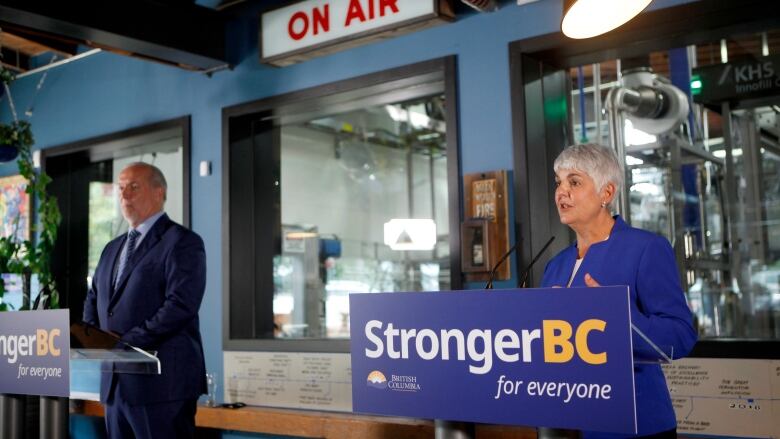B.C.'s COVID-19 economic recovery plan includes $660M in business tax incentives
Premier, finance minister announce $1.5B in spending measures

The B.C. government has announced $660 million in new tax incentives for businesses alongside its newly unveiled $1.5-billion pandemic economic recovery plan.
Premier John Horgan and Finance Minister Carole James announced details of the new spending measures Thursday, building on a suite of previously announced provincial and federal commitments.
"This recovery plan is just the start, the first step on a long road of recovery that we will take together," Horgan said.
"We'll continue to invest wherever and whenever we need to, to keep our economy growing and keep people safe."
The tax incentives include a temporary 100 per cent PST rebate on select machinery and equipment for eligible businesses, and a 15 per cent tax credit on eligible new payroll to encourage businesses to hire more workers.
Members of the legislature unanimously approved funding for the plan in March.
The $1.5-billion package includes funding for the tourism sector, food security, climate action, and technology and innovation.
Many of the measures announced Thursday were already known, including $300 million to hire 5,800 new health-care workers and $242 million to reopen schools. Overall, $417 million has been earmarked to support jobs and training.
About $100 million in infrastructure grants will be available for projects that are ready to begin and there is $300 million in grants for small- and medium-size businesses to help protect more than 200,000 jobs in hard-hit industries.
The government will also launch a $500-million investment fund, separate from the recovery fund, to help small and medium businesses scale up, including tech companies purchased by out-of-province buyers.
All told, the province intends to spend more than $4 billion on restarting the economy.
'Tough, tough times' for tourism
The package also includes $100 million for the province's hard-hit tourism sector, far less than what the industry had asked for.
The province says it will launch a tourism task force that will decide on how to spend $50 million of the funding in the current fiscal year. The other half will go toward tourism-dependent communities, marketing for regional tourism, and a recovery strategy for Destination B.C., the province's tourism agency.
The funding falls short of the tourism industry's request to receive $680 million of the province's $1.5-billion recovery package.
"This is tough, tough times for that sector," Horgan said. "We've put in place programs that will help them get through the next short while."
Extra $10K grants for tourism operators
The industry will also be aided by the recovery grants for small and medium-sized businesses, which provide tourism operators with an additional $10,000 top-up.
"As the premier said, it's a good start," said Walt Judas, CEO of the Tourism Industry Association of B.C.
The pandemic has devastated B.C.'s tourism industry, which is estimated in 2018 to have brought in $20.5 billion in revenue and contributed 161,500 jobs to the B.C. economy.
The industry is projected to earn less than $7 billion this year, Judas said.
The funding will help tourism operators pay immediate bills like rent and utilities, Judas said, but the group is keen on quickly getting funds to businesses so they can survive in the winter months.
Judas said he hopes the province will provide more tourism funding in its 2021 budget.
No decision on election
The announcement follows five weeks of public consultations held by the province over the summer on how to use the recovery funds.
The plan was seen by some as a way for the party to pave the way for a snap election.
Horgan said Thursday he had not decided whether to call an election, noting his efforts were focused on the recovery.
B.C. Liberal Leader Andrew Wilkinson said the government was too late in rolling out its plan, noting that tourism operators suffered major job losses during the summer.
"The NDP have delayed this clearly to stoke election fever with an economic plan," he said.
B.C. Green Party Leader Sonia Furstenau said her caucus was consulted on the plan and noted it was a good start, but argued it lacked imagination.
"We can dream bigger," she said in a statement. "We can strive to put every young person who needs a job to work restoring and healing our natural environment, begin a mass building-retrofit campaign to create jobs in every community, and create a just transition for workers in dying industries."
Vancouver Mayor Kennedy Stewart applauded the recovery plan for providing $1.62 billion to municipalities and transit.
Stewart said in a release that the funds, which includes federal contributions, will stabilize the city's budget and help reopen services like libraries, community centres and child care facilities.
The B.C. government says its total response to the COVID-19 pandemic is now more than $8.25 billion.
Corrections
- A previous version of this story stated that the $660 million in tax incentives were part of the $1.5-billion recovery plan. In fact, the tax incentives were in addition to the funds for the recovery plan.Sep 18, 2020 9:22 AM PT
With files from The Canadian Press and Meera Bains

